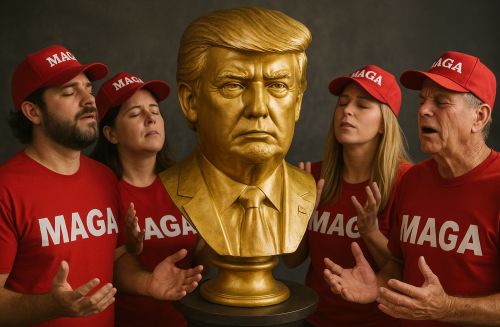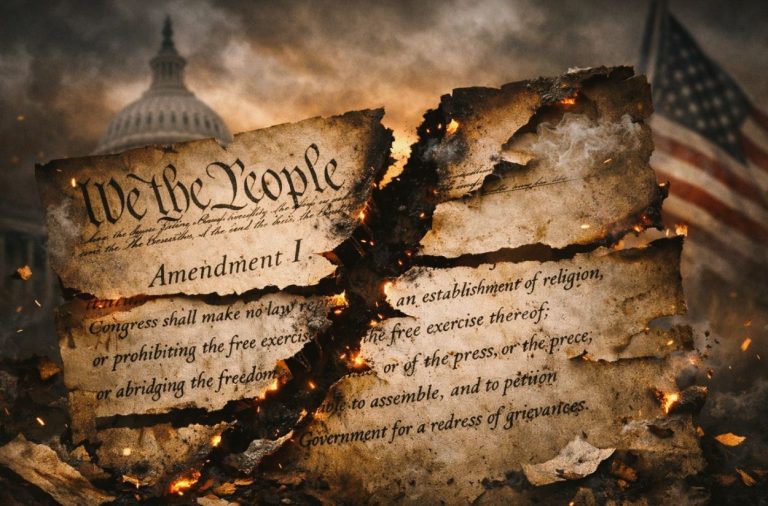

Every democracy is sustained by a simple covenant: that truth, however inconvenient, must remain public property. The Trump movement has fractured that covenant.

By Matthew A. McIntosh
Public Historian
Brewminate
Politics of Faith, Not Policy
The chants begin long before Donald Trump appears. “God, Guns, and Trump!” echoes through the packed hall as thousands raise their phones, some with hands lifted as if in worship. What unfolds isn’t a traditional political rally; it’s ritual. There are no detailed policy debates, no questions of governance. Instead, followers affirm a shared creed of belief and belonging.
In recent years, analysts have warned that Trump’s following has taken on the psychological structure of a cult. As reported, “factual thinking is forbidden” within the movement, replaced by an emotional logic of faith and grievance. Academic studies echo this finding: scholars at the University of Vienna describe Trumpism as a “personality cult” characterized by collective projection and moral absolutism.
Yet this article does not focus on Trump as the charismatic leader. It focuses on the followers: their rituals, psychology, and identity. From sociological surveys to psychological profiling, the evidence points to a transformation in which political allegiance has evolved into belief itself. The question that now shadows American democracy is not merely who leads, but why so many follow, and how far faith will bend reality in service of devotion.
The Believing Class: Identity as Religion
For Trump’s most fervent supporters, politics has become inseparable from identity. They do not simply support a candidate; they inhabit a faith. A 2023 study concluded that extreme Trump followers exhibit patterns of “authoritarian submission and moral disengagement,” consistent with cult psychology. Similarly, research from the Australian National University found that self-identified “Trumpists” show unusually high measures of conscientiousness and loyalty, traits that can harden belief into moral identity.
Sociologists now describe this phenomenon as “political moralization,” where political loyalty becomes a sacred duty. Trump’s base operates less as a political coalition and more as “a cultural faith community” unified by grievance and prophecy. In such communities, dissent is not disagreement; it is apostasy.
This fusion of politics and piety has created a new kind of civic belonging. When followers call Trump “anointed” or “chosen,” they are expressing more than affection; they are articulating a theology of identity. Cult behavior among Trump’s followers emerges from psychological need: “a search for purpose, certainty, and belonging in a chaotic world.” In this sense, the Trump movement functions as a surrogate faith, a congregation built not around scripture, but around story, grievance, and the promise of redemption through one man.
Rituals of Belonging: From Rallies to Online Liturgy
At Trump’s rallies, devotion takes the form of worship. The setting is theatrical (light shows, soundtracks, slogans) but its effect is religious. Observers describe these events as “mass liturgies of belonging,” where individuals synchronize their emotions in rhythmic chants that collapse politics into communion. When Trump declares, “They’re coming after me because they’re really after you,” the crowd answers with affirmation, not analysis. It is a moment of collective fusion, where identity dissolves into the mass and loyalty becomes ecstasy.
Sociologists studying group cohesion note that rituals like these provide both psychological safety and moral reinforcement. Followers describe attending rallies as “coming home.” The repetition of symbols (the red cap, the oversized flag, the defiant bumper sticker) creates a shared language of belief. To outsiders these may appear as props of fandom; to participants, they are talismans. They transform everyday spaces into sacred zones, places where the faithful reaffirm both their membership and their moral superiority over a hostile world.
The design of the rallies heightens this sense of transcendence. The music builds before Trump’s entrance; the crowd surges when the lights dim. He appears last, elevated, often preceded by videos or prayers framing him as divinely appointed. In that moment, the audience becomes congregation. Anthropologists call this “affective synchronization,” a phenomenon in which emotion moves contagiously through a group until it achieves unity of feeling. The shared catharsis doesn’t persuade; it consecrates.
But the rituals extend far beyond the physical arena. Online, the movement sustains a digital liturgy. On platforms like Truth Social, Telegram, and X, followers repeat slogans, circulate memes, and quote Trump’s phrases as scripture. Within these communities, fact-checking is treated as “heresy,” while affirmation is sanctified as truth. Each repost, emoji, or “MAGA” hashtag is a micro-ritual that reaffirms belonging. Information itself becomes subordinate to loyalty; participation, not verification, defines the faithful.
The sociological result is cohesion through ritualized performance. Trump’s followers increasingly “sustain themselves through repetition, spectacle, and the comfort of shared persecution.” That rhythm of reaffirmation blurs the line between activism and devotion. Whether waving flags in stadiums or posting from living rooms, the community practices a single act, believing together. And in that act, belief itself becomes the political end.
The Conversion Effect: Cognitive Dissonance and Defense of the Faith
Every cult sustains itself through contradiction. What binds followers is not coherence but the ability to reinterpret dissonance as proof of righteousness. In the Trump movement, this inversion of logic is its lifeblood. Supporters confronted with criminal indictments, court losses, or policy reversals rarely waver; they double down. Attempts to introduce factual corrections “only reinforce belief,” as followers dismiss contrary evidence as propaganda. This dynamic mirrors what psychologists describe as “motivated reasoning,” the cognitive process by which individuals reinterpret reality to preserve faith. In other words, every accusation becomes a test, and every test, a vindication.
Even Trump’s failures serve as conversion moments. Each perceived injustice—the indictments, the bans, the impeachments, functions as a parable of persecution. To his followers, the more he suffers, the truer his message becomes. Many adherents “derive moral purpose from his victimhood,” interpreting judicial process as crucifixion and vindication as resurrection. The pattern is unmistakably religious: martyrdom transforms the accused into the anointed.
This reconfiguration of evidence reshapes the individual mind as well. A peer-reviewed study found that high-commitment Trump supporters exhibited “cognitive rigidity” and a preference for intuitive over analytical thinking styles, traits common in insular belief systems. These cognitive dispositions protect the believer from dissonance by converting discomfort into moral clarity. Facts that once challenged conviction now become proof of conspiracy. The circle closes neatly: opposition is the enemy, and the enemy’s existence confirms the truth of the cause.
At the social level, this defense of faith has produced an information ecosystem impervious to external critique. “Movement media” replaces journalism with affirmation, transforming followers into curators of their own reality. When Trump claims an election was stolen or a judge corrupt, the faithful respond not with inquiry but with immediate assent. The pattern is less about persuasion than maintenance, a continuous conversion in which the act of believing sustains itself. What emerges is not an argument but a liturgy of denial, repeated daily across screens and rallies alike, shielding the movement from the heresy of doubt.
Persecution and Prophecy: The Shared Mythology of the Chosen Few
To understand the cultic endurance of Trump’s base, one must grasp the power of persecution. Within this movement, suffering is sacred currency. Every indictment, protest, or media criticism feeds a collective conviction that they, and their leader, are soldiers in a spiritual war. Loyalty thrives precisely because of adversity: “For true believers, each attack only deepens the faith.” Trump’s repeated framing of political opposition as divine struggle, “They’re not after me, they’re after you,” has become not just rhetoric, but doctrine. The crowd’s roar is not mere agreement; it is liturgical assent.
The religious undercurrents of this persecution narrative are unmistakable. Among white evangelical followers, Trump is often described in messianic language: an imperfect vessel chosen for divine purpose. Prophecies of his anointing circulate widely across churches and online ministries. In one telling instance, pastors declared that his 2024 survival of an assassination attempt was “God’s hand” confirming his destiny. Such framing fuses politics and eschatology, casting Trump’s career as a redemptive drama unfolding against cosmic evil. Within this mythos, legal challenges are not evidence of wrongdoing but trials of faith.
What makes this mythology resilient is its collective dimension. Followers identify not just with Trump but with one another as a remnant, the few who still see the truth in a fallen world. This identification is reinforced daily through online networks and local gatherings where persecution stories are traded like testimonies. “They laugh at us, they censor us, they hate our God,” one woman told researchers in a University of Vienna study. The language mirrors that of high-demand religious movements: believers describing themselves as both victims and visionaries, surrounded but undefeated.
The Commonwealth Club points out that such apocalyptic framing supplies meaning to dislocation. Economic anxiety, social change, and demographic transformation are reinterpreted through moral struggle. Trump becomes the redeemer of lost certainty. “Prophecy,” in this context, is less about prediction than validation. The promise that the faithful will prevail, whether through divine justice or electoral victory, transforms despair into hope. Every postponement of triumph only heightens anticipation.
In this shared mythology, Trump’s followers are not participants in politics; they are apostles of revelation. Their devotion transcends ordinary partisanship because it operates in a sacred time, where defeat is never final and faith is proof of truth. What remains is not belief in policies or platforms but a narrative of divine election. And as history has shown, from imperial cults to modern populist movements, such narratives are immune to correction. The chosen few do not lose; they await fulfillment.
Faith over Fact: When Politics Becomes Theology
For the faithful, evidence no longer governs truth. Within Trump’s following, the hierarchy of belief has inverted: conviction precedes verification, and facts must conform to faith. Followers often reject factual corrections not because they are unaware of them, but because accepting them would threaten belonging. In this moral economy, reason is suspect, and doubt is treason. The very act of questioning becomes a betrayal of community.
This reflex is not unique to Trumpism; history offers parallels in movements that sacralized authority. But what distinguishes Trump’s followers is the sheer integration of political identity with theological certainty. “The movement operates as a moral order,” its analysts write, “where truth is determined by who speaks it.” That moral inversion, where leader defines reality, transforms politics into faith practice. To reject a Trump claim is not to disagree with a politician but to deny a revelation.
The machinery of this new theology functions through repetition. Each post, chant, or sermon reaffirms that mainstream institutions (courts, media, universities) are corrupt and hostile. For many followers, these institutions now occupy the role of satanic adversary in a cosmic struggle. Within that cosmology, Trump stands not merely as leader but as interpreter of reality itself. The boundary between political loyalty and spiritual submission fades until both collapse into the same act: believing against all odds.
When politics becomes theology, evidence loses its corrective power. A policy failure can be rebranded as persecution, a lie as strategy, a crime as sacrifice. What matters is not what happened but what it means within the myth. As truth becomes revelation and dissent becomes sin, democracy faces its gravest paradox: a citizenry that mistakes faith for freedom and blind obedience for conviction.
The Faithful and the Fragile Republic
Every democracy is sustained by a simple covenant: that truth, however inconvenient, must remain public property. The Trump movement has fractured that covenant. Within its culture, truth is no longer something to be discovered, tested, or debated, it is something to be bestowed. When followers proclaim, “We know what’s really going on,” they are not asserting evidence but asserting election: the belief that they alone are chosen to see what others cannot. This mindset “redefines reality through belonging,” turning faith itself into political armor.
That armor is thick. Trump’s followers interpret his legal and moral crises not as failures but as “proof of persecution,” a sign that their cause is righteous precisely because it is embattled. This inversion of guilt into grace, defeat into destiny, ensures the movement’s survival regardless of outcome. It no longer needs victory to endure. The belief sustains itself.
In such a landscape, traditional institutions (Congress, the courts, the press) are powerless to reassert credibility through evidence alone. Facts cannot reach those who treat disbelief as virtue. The Daily News captured this paradox succinctly: “To the devoted, falsity is faithfulness.” What results is a civic inversion where the very mechanisms of accountability (indictment, investigation, conviction) feed the myth rather than puncture it.
The stakes extend beyond one man or moment. As scholars from the University of Vienna and The Loop note, movements organized around charismatic devotion rarely dissolve when the leader falters; they evolve into cultural identities that outlive their origins. Trumpism, now functioning as a creed rather than a campaign, risks becoming a permanent faith of resentment, a theology of grievance baked into the American story.
In the end, the danger is not that Trump’s followers worship a man, but that they have forgotten how to doubt. Doubt is the muscle of democracy, the act that keeps reason alive. Once it atrophies, the republic itself weakens. Whether this era becomes a cautionary tale or a turning point will depend not on one leader’s fall, but on whether the faithful can relearn the harder discipline, the courage to question what they most want to believe.
Originally published by Brewminate, 10.23.2025, under the terms of a Creative Commons Attribution-NonCommercial-NoDerivatives 4.0 International license.


